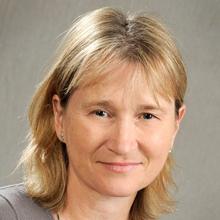Top University doctor calls for children's sleep to be part of public health agenda

A leading children's doctor has warned there is a "desperate need" to get children's sleep on the public health agenda in England and across the UK.
Dr Catherine Hill, a senior lecturer in Child Health at the University of Southampton, and a consultant in paediatric sleep medicine at Southampton Children's Hospital, said there is already a burden to the NHS "here and now" from childhood sleep problems but the issue is "hidden from view".
She spoke out ahead of BBC Panorama's Sleepless Britain programme, broadcast at 20:30 BBC One on 6 March, and the development of the British Paediatric Sleep Association (BPSA), which brings together sleep experts from across the country.
The programme will detail how NHS data shows hospital attendances in England for children under 14 with sleep disorders have almost tripled in 10 years, from just under 3,000 in 2005-06 to more than 8,000 in 2015-16.
"As a country we need to wake up to the importance of sleep urgently – it is, without doubt, as vital to a child's health and wellbeing as good nutrition, yet it has been persistently ignored by society socially and politically," said Dr Hill, who is also an associate professor of child health at the University of Southampton.
"The burden to the NHS, education system and society as a whole is immense, with lack of sleep among children leading to a wide range of problems including reduced school performance, behaviour problems and the hidden epidemic element of obesity."
Dr Hill said while any behaviour change is difficult to achieve, there is evidence of successful long-term campaigns which have resulted in significant developments in government policy and public perception.
"I think an excellent parallel is the gradual dawning of the dangers of sugar – chef Jamie Oliver did a huge amount of work fronting this campaign – with lots of media support and political lobbying and similar energy is needed for sleep," she said.
"Look at the government's investment in healthy eating, with huge funding provided for online programmes – the efforts have paid off as people have a better understanding than ever of the dangers of sugar and obesity."
To help promote the importance of children's sleep and push for more awareness, investment and prominence, sleep medicine experts across the UK have formed the BPSA.
The group aims to improve public knowledge, ensure paediatricians and other health professional receive appropriate education and professional development, promote research, establish sleep medicine as an accredited specialty and develop national standards of care.
Dr Hill, who is the BPSA research lead, said: "As paediatric sleep medicine is not yet a recognised field in the UK – unlike in Australasia and USA – the problem is distributed across a number of specialties so, to some extent, it is hidden from view.
"There is a clear increasing demand on respiratory services for children with breathing problems in sleep though and NHS commissioners are aware of this, but the problem is multi-layered and not just about hospital services.
"The objective with the BPSA is to give us a representative body that can bring all aspects together and really challenge society to embed children's sleep into the public health agenda."
Dr Don Urquhart, a consultant in paediatric respiratory and sleep medicine at the Royal Hospital for Sick Children in Edinburgh and co-chair of the BPSA, said: "Specialists across the UK are seeing increasing prevalence of sleep phase disorders alongside use of light-emitting technologies such as tablets and smartphones.
"There is a rise in childhood obesity – a condition that can impact on the upper airway causing obstructive sleep apnoea – while other primary sleep conditions such as narcolepsy also appear to be increasing, along with the number of children using ventilator technology who require access to sleep diagnostics."
He added: "As a result, an NHS that allows equitable access to experts in paediatric sleep and available sleep diagnostics is now essential."
Dr Francois Abel, a consultant in paediatric sleep medicine at Great Ormond Street Hospital for Children in London and co-chair of the BPSA, said: “The last few years have seen an exponential rise in the number of ventilated children in the UK. These children often have multisystem problems and require sleep diagnostics to titrate and maintain ventilator support.
“With the increase in other sleep disorders, there is a clear increasing demand on respiratory services for children with breathing problems in sleep and the problem extends from hospital services and into the community. There is ongoing evidence at present that this is not addressed appropriately.”
Dr Mike Farquhar, a consultant in sleep medicine at the Evelina London Children's Hospital and BPSA committee training lead, added: "Sleep problems in childhood have always been common but many GPs and paediatricians lack confidence in assessing and managing these.
“We are working with organisations, including the Royal College of Paediatrics and Child Health, to improve education and training about sleep difficulties in children and to support families and children's doctors in tackling these issues."
Published courtesy of University Hospital Southampton NHS Foundation Trust.
